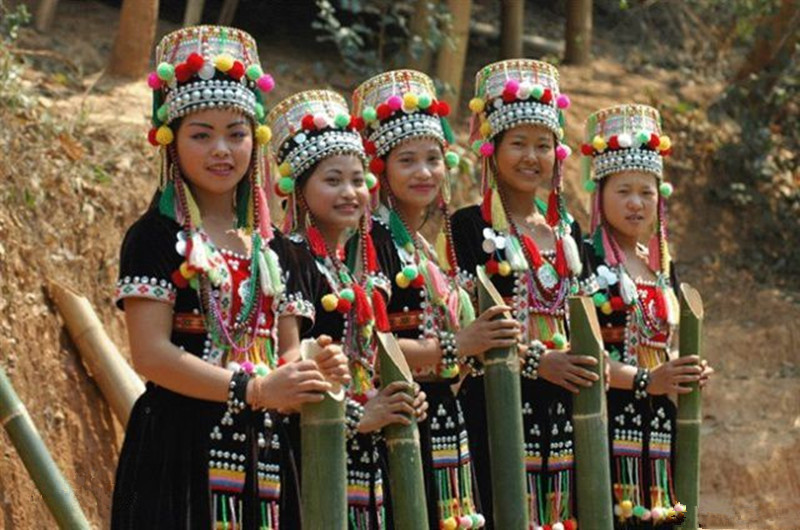
The Religion of the Hani Yeche Ethnic People
The religion of Hani Yeche people is based on the cult to the ancestors and in the deification of the forces of the nature. The fundamental concept is the existence of different souls or “yuela.”
They believe that people are eminently spiritual beings that have twelve souls. After death the soul of people becomes a spirit. Much more powerful than these spirits are the gods. A person can fight the spirits, but before the gods he can only submit himself. They divide their main deities according to the place where they inhabit. Their six main gods are the following:
Momi or God of the Sky – their most important deity;
Mishu or God of the Earth – their second deity;
Pumaepo God of the Forests – very important to them as their life is linked to the forest;
Other important deities are: God of the Water, God of the Fire, and God of the Cliffs.

There are other gods of the nature, called “chang” that are worshipped along the territory of the Yeche. They are possibly related with the structure of matriarchal clans of the old Yeche society.
The cult to the ancestors has for them a primordial function. In every Yeche house, there are three baskets nailed in the back wall that face to the forest in order that, if the ancestors return, they can live in them. It is said that the ancestors only return in the important festivals: those of the third, fifth and seventh month, when they like to visit their descendants in the family. When the festivity ends they go back to the distant Da’e or Land of the Ancestors. But if their descendants don’t follow the social rules, the multitude of ancestors cannot take care of them. To have their ancestors happy the Yeche doesn’t violate their laws and make sacrifices to them on the main festivals. At home they place a table with six bowls of rice with meat and some wine. The men also worship the ancestors in the baskets hung in the wall, thinking that this way they will protect their souls.
Most of the Yiche people still follow their traditional religion, and carry on a set of family and village ceremonies along the year. Their ritual master is called moqi, whose functions are more or less the same that the beima perform among other Hani branches. There are two grades of moqi, called niaqi and angqi. Only men can be moqi as, according to their legends, in the past there were two sisters that were moqi, and suffered inauspicious deaths. Most of the moqi aspirants must study under a practitioner moqi before were considered themselves as moqi. They don’t have many ritual implements but usually, when performing a ceremony, the wear a “duck’s tongue cap” and a white band around it. They don’t need to get any supernatural conscious state but know the elements and scriptures that must be used in each ceremony. Their most common ceremony is to call some of the twelve souls each person have, because it will suffice one of the souls is lost to get an illness. They have an important role in the ancestral rites and funerals of every family.
Other kind of religious specialist is called guqi. These guqi usually do not perform their traditional ceremonies but are considered intermediaries between the world of the human and that of the spirits, including their deities and the spirits of their ancestors; as such carry on divination ritual and “spirits communication”, as through them the people can make questions to their family dead and receive answers.
To arrange the public ceremonies carried on in the village every year are chosen some leshi that will overview that these ceremonies are correctly performed.
One more interesting religious specialist is the called ei’du or head of the dragon. Each village has a dragon tree where some times every year are offered sacrifices to the dragon spirit. This head of the dragon is chosen by the dragon spirit, who communicates his choice by divination to the inhabitants of the village. He is the responsible for the good or bad luck the village will enjoy, and he must observe a lot of taboos, especially after the ceremonies to the dragon spirit. If a village has some consecutive years of bad luck it is thought that they chose a wrong head of the dragon, and a new divination will be held to choose a new one.

 7 Days GolfingTour
7 Days GolfingTour
 8 Days Group Tour
8 Days Group Tour
 8 Days Yunnan Tour
8 Days Yunnan Tour
 7 Days Shangri La Hiking
7 Days Shangri La Hiking
 11 Days Yunnan Tour
11 Days Yunnan Tour
 6 Days Yuanyang Terraces
6 Days Yuanyang Terraces
 11 Days Yunnan Tour
11 Days Yunnan Tour
 8 Days South Yunnan
8 Days South Yunnan
 7 Days Tea Tour
7 Days Tea Tour
 8 Days Muslim Tour
8 Days Muslim Tour
 12 Days Self-Driving
12 Days Self-Driving
 4 Days Haba Climbing
4 Days Haba Climbing
 Tiger Leaping Gorge
Tiger Leaping Gorge
 Stone Forest
Stone Forest
 Yunnan-Tibet
Yunnan-Tibet
 Hani Rice Terraces
Hani Rice Terraces
 Kunming
Kunming
 Lijiang
Lijiang
 Shangri-la
Shangri-la
 Dali
Dali
 XishuangBanna
XishuangBanna
 Honghe
Honghe
 Kunming
Kunming
 Lijiang
Lijiang
 Shangri-la
Shangri-la
 Yuanyang Rice Terraces
Yuanyang Rice Terraces
 Nujiang
Nujiang
 XishuangBanna
XishuangBanna
 Spring City Golf
Spring City Golf
 Snow Mountain Golf
Snow Mountain Golf
 Stone Mountain Golf
Stone Mountain Golf


















